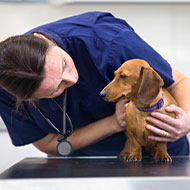WSAVA announces free COVID-19 webinar

The webinar will set out the latest COVID-19 advice for veterinary professionals.
The WSAVA has announced a free webinar for veterinary professionals setting out the latest thinking and advice on the COVID-19 crisis.
The webinar, entitled 'COVID-19 and Companion Animals: What we know today', will take place on Friday, 17 April at 15.00hrs (London). During the event, a panel of experts will advise on optimal preventative care during the pandemic and on the importance of promoting pet welfare and supporting the human-companion animal bond during this difficult time.
Speakers will include Dr Vanessa Barrs, Professor of Companion Animal Health at the City University of Hong Kong; Dr Michael Lappin, Chair of the WSAVA One Health Committee and WSAVA President Dr Shane Ryan.
“The COVID-19 pandemic is causing distress and uncertainty for us all. It also poses a significant and real threat to companion animal welfare, particularly given conflicting media reports as to whether pets can spread the virus,” explained Dr Shane Ryan.
“While the situation continues to evolve, we hope that our speakers can bring clarity to all veterinarians so that they can reassure their clients, their co-workers and their communities based on the evidence available. We hope our recommendations will also help them to continue to provide the highest standard of care to their patients.”
The webinar will take place at 14.00hrs GMT {10.00hrs (EST); 15.00hrs (London); 22.00hrs (Hong Kong)} on Friday, April 17, 2020, and will later be available on the WSAVA COVID-19 resource hub. Please visit https://www.youtube.com/watch?v=lMCYLATHhzs to register your interest.



 The latest
The latest